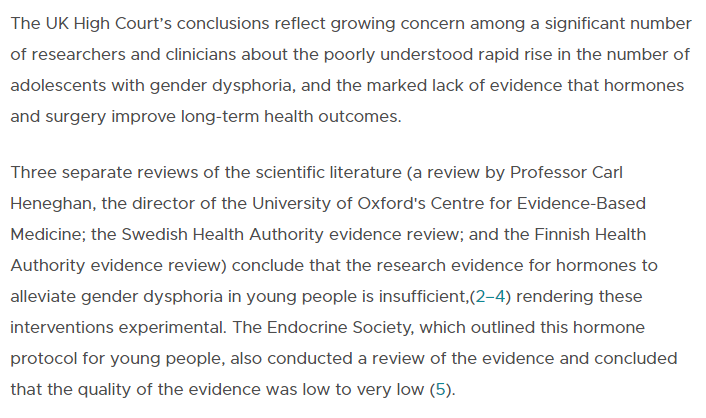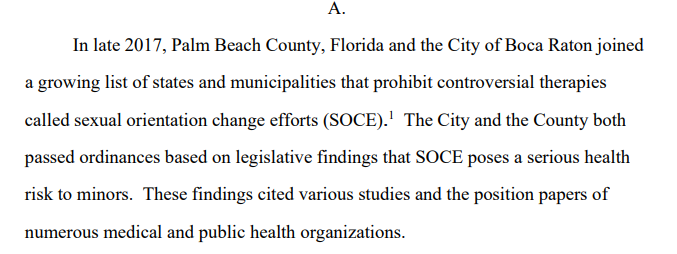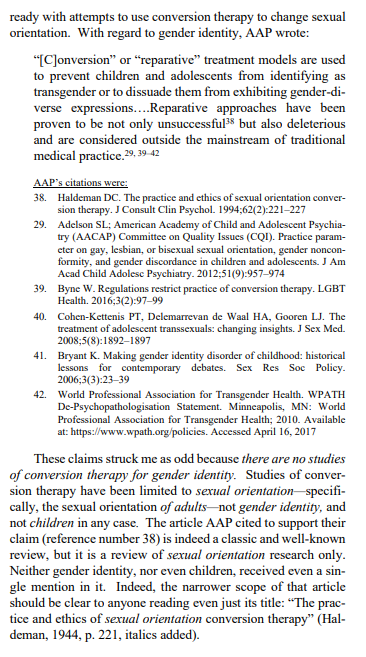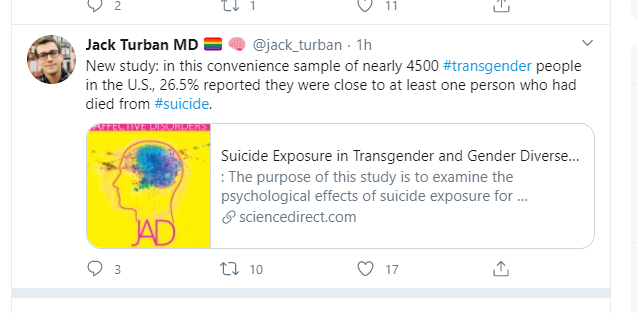
Two courts on the opposite side of the world recently made decisions on children & puberty blocker drugs which stop natural development. In the English case, the High Court said it was "highly unlikely" that a child 13 or under could consent to this "experimental" treatment. 1/ 

In Australia, the court decided it was in the "best interests" of a 12 year-old to begin puberty blockers to prevent "life-long damaging masculinisation". Born a boy, the child identifies as female.
Both rulings came down in December 2020 but a key difference is that the English court was considering whether children could give informed consent to their own treatment, while the Australian judge allowed doctors to proceed with the mother consenting on behalf of the child.
This was a state Supreme Court judge. Usually it's Australia's federal Family Court which hears cases about under-age consent to treatment for gender dysphoria. Over several years the Family Court had made it progressively easier for minors to get hormonal drugs & mastectomy. 

But in the September 2020 case "re Imogen", the Family Court tapped the brakes, declaring the law requires doctors to check *both* parents agree before treating kids. The court also curtailed the promotion of fast-track "informed consent", which sidesteps thorough assessment. 

In December's Supreme Court case in Queensland, the child's (criminal & abusive) father was out of the picture & the psychiatrist "Dr B" explained there was "apt to be delay" if they took their puberty blocker request to the Family Court following its re Imogen ruling.
A trans advocate agreed, telling media “Family law is too slow regarding children under 16 whose parents are of differing opinions with regards to gender dysphoria & puberty blockers". Before Imogen's case, the Family Court was acclaimed as the champion of trans health rights. 

The Queensland court ruling on December 18 made no mention of the December 1 Tavistock verdict, although that landmark English case would have been on the radar for Australia's coterie of gender clinicians (despite a reporting blackout at the national broadcaster @abcnews).
Might this explain another unusual aspect of the Queensland case -- the apparent disagreement *within* a specialist gender clinic about the capacity of a child to consent to transgender hormonal treatment?
Dr B, the psychiatrist, believed the child could give "informed consent to the use of reversible puberty blockers at her level of maturity & cognitive development as a young transgender female adolescent with Autism Spectrum Disorder".
Dr C, an endocrinologist, did not believe the child "fully understands what is proposed & is not persuaded that she is currently Gillick competent". The common law Gillick test for under-age medical consent was at the heart of the English Tavistock case.
The Queensland Supreme Court judge said there was "uncertainty" as to whether Dr B's view -- that the child could give informed consent -- was "endorsed by the entire treatment team" at the specialist clinic.
The judge said "medical practitioners have concerns as to whether they can commence treatment" with just 1 parent on board. Treatment without legal consent is serious. Australia has an official review of child gender medicine & authorities overseas are edging towards caution. 

So, the judge authorised the doctors to start puberty blocker drugs, relying on the mother's consent. In the UK, following the Tavistock ruling, there is talk of court action to try to resume puberty blockers -- by using parental consent. See Case Update crowdjustice.com/case/protect-g… 

Relying on parents would clash with the trans kids health narrative, which avoids detailed discussion of evidence & offers stories of engaging young people whose self-knowledge & right to "autonomy" are emphasised. Post-Tavistock, there has been a flurry of these in the media. 

In the Tavistock case, the UK clinic argued it "would be an intrusion into the child or young person’s autonomy if a decision about (puberty blocker) treatment were to be made by the court not by the patient". The "gender affirmative" model is touted as child-led & rights-driven.
The English court did not have to consider whether or not parents could consent on behalf of children unable to understand medical treatment supported by so little evidence that the judges concluded it was "experimental".
The Tavistock, a large youth gender clinic with international influence, declared it had "never administered, nor can it conceive of any situation where it would be appropriate to administer (puberty) blockers on a patient without their consent".
Ruling judiciary.uk/wp-content/upl…
Ruling judiciary.uk/wp-content/upl…
The Tavistock believed English law *would* allow parents to consent on behalf of kids, but the clinic took a stand on child autonomy, & sought permission to challenge the Dec 1 ruling in the Court of Appeal, which has just agreed to a hearing by March 2022. 

In the Australian puberty blockers case, the judge said it was her duty to resolve the consent issue in the way that "a wise, affectionate and careful parent would act for the welfare of a child".
The judge's same-day ruling --- queenslandjudgments.com.au/case/id/347183
The judge's same-day ruling --- queenslandjudgments.com.au/case/id/347183
• • •
Missing some Tweet in this thread? You can try to
force a refresh













